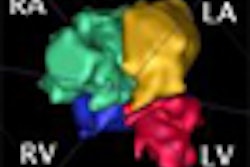
NEW YORK (Reuters Health), Nov 11 - Wireless capsule endoscopy is feasible for detecting small intestinal pathology in children younger than 8 years old, according to a report in the November Gut. However, most children in this age group are unable to swallow the small device, so it needs to be introduced endoscopically.
"Capsule endoscopy is a suitable means for diagnostic purposes in young children whose symptoms cannot be explained otherwise," Dr. Annette Fritscher-Ravens from University Hospital Kiel, Germany, told Reuters Health. "Despite the quite large size of the capsule, this can pass the entire gastrointestinal tract, which makes an evaluation of the small bowel possible without pain and exposure to a high complication rate."
Dr. Fritscher-Ravens and colleagues evaluated the feasibility of this technique for defining small intestinal pathology in 83 children aged 1.5 to 7.9 years. The smallest child weighed 10 kg.
Wireless capsule endoscopy identified a source of bleeding in 16 of 30 children with obscure gastrointestinal bleeding and/or chronic anemia, evidence of small intestinal Crohn's disease in 11 of 20 children suspected of having the disease, significant pathology in 6 of 12 children with recurrent abdominal pain and 6 of 9 children with protein-losing enteropathy, and varying degrees of villous atrophy in 6 of 12 children with malabsorption.
Four studies in three children were incomplete, the authors report, but relevant diagnostic information was obtained in two of these children.
About a quarter of the children were able to swallow the capsule, while the remaining three quarters had the capsule endoscopically introduced into the duodenum.
Capsule retention did not occur in any examination, the investigators say.
"More than with adults, in children one has to weigh the benefits of a diagnostic test with the cost of complications to be expected," Dr. Fritscher-Ravens explained. "This is a very good ratio with capsule endoscopy, as the only expected complication is that it can get stuck, when there is a stricture in the small bowel. But this incident is then also the reason for the complaint. It is also very rare."
By Will Boggs, MD
Gut 2009;58:1467-1472.
Last Updated: 2009-11-10 14:10:09 -0400 (Reuters Health)
Related Reading
Capsule endoscopy in ER hastens treatment of upper GI bleeding, October 28, 2009
Capsule endoscopy lacks sensitivity of colonoscopy, July 16, 2009
Copyright © 2009 Reuters Limited. All rights reserved. Republication or redistribution of Reuters content, including by framing or similar means, is expressly prohibited without the prior written consent of Reuters. Reuters shall not be liable for any errors or delays in the content, or for any actions taken in reliance thereon. Reuters and the Reuters sphere logo are registered trademarks and trademarks of the Reuters group of companies around the world.


















